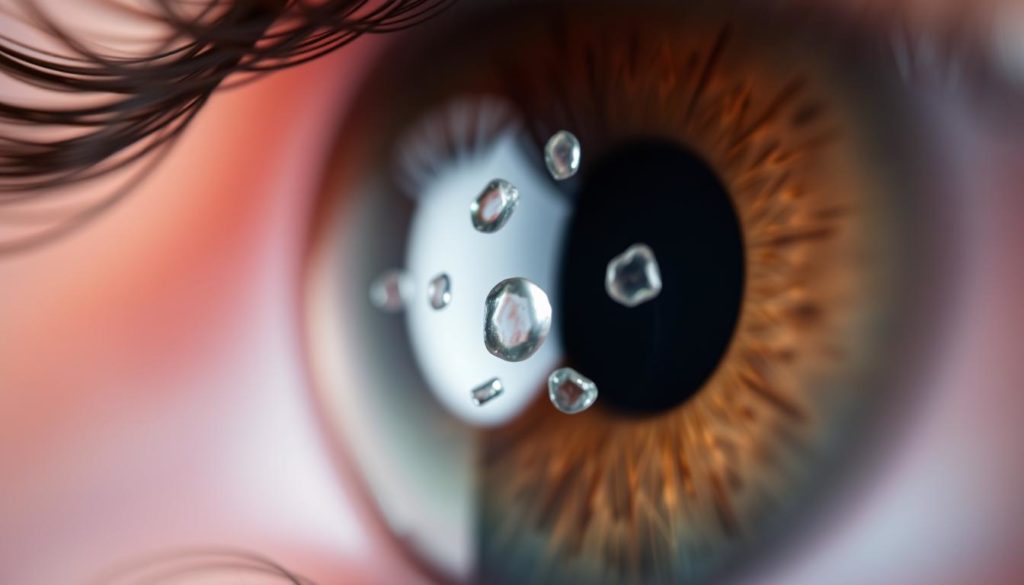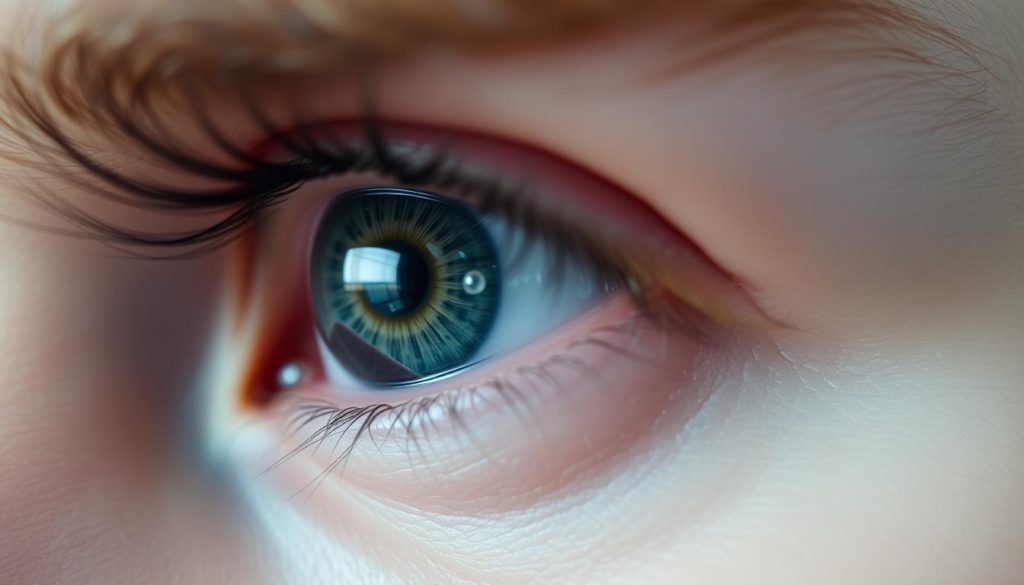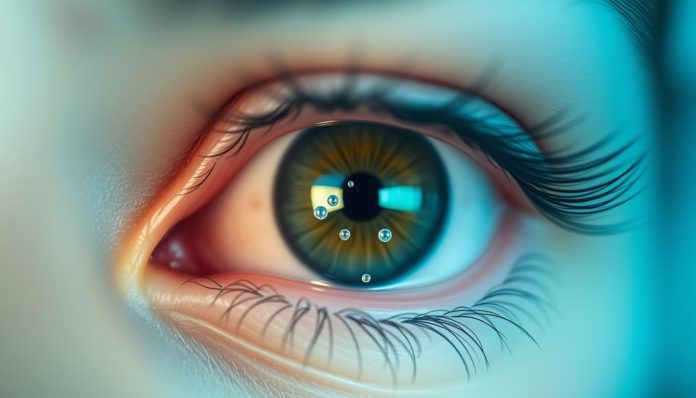Did you know that about 76% of people will see eye floaters at some point? These tiny specks in your vision might seem harmless. But, they can sometimes show signs of serious vision changes. It’s important to know when to seek medical attention for your eye health.
We’ll explore the signs and symptoms that mean you should see an eye care specialist. We’ll talk about what causes floaters and when they might be a sign of something more serious. Your vision is very important. Knowing when to act can really help.
Understanding Eye Floaters
Eye floaters are tiny specks or threads that seem to drift in your vision. They are usually harmless but can worry you if they change often or suddenly.

What Are Eye Floaters?
Eye floaters look like small, shadowy shapes in your vision. They might look like dots, squiggly lines, or cobwebs. They’re most noticeable against a plain background, like a blue sky or a white wall.
They move with your eye movements but seem to disappear when you try to focus on them.
Causes of Eye Floaters
Several factors can make eye floaters appear:
- Aging: The most common cause is when the vitreous humor inside the eye changes.
- Eye Injuries: Trauma to the eye can change its internal structure, causing floaters.
- Inflammation: Eye inflammation, like uveitis, can also lead to floaters.
- Diabetic Retinopathy: Diabetes can harm your vision and cause floaters.
Who Is at Risk?
Some people are more likely to see eye floaters:
- Those over 50 years old.
- People with a history of eye injuries or inflammation.
- Those with diabetes or other chronic conditions.
Knowing about eye floaters, their causes, and who’s at risk helps keep your eyes healthy. It’s important to notice any sudden vision changes and seek help.
Symptoms That Require Immediate Attention
Changes in your vision can be scary, especially if they happen fast. Some changes are okay, but others need you to see a doctor right away. Let’s look at these important signs.
Sudden Increase in Floaters
A sudden increase in floaters might mean something serious. Floaters are normal, but a lot more than usual is a warning sign. You should get medical help if this happens.

Accompanied by Light Flashes
Floaters with light flashes are a big warning. These flashes look like quick streaks of light in your sight. They could mean a problem with your retina. Seeing them means you should see an eye doctor fast.
Loss of Peripheral Vision
Loss of peripheral vision is very scary. It feels like a shadow or curtain in your sight. If you see floaters and flashes with this, get medical help right away.
Routine Eye Exams and Their Importance
Keeping your eye health in top shape is key to your overall well-being. A big part of this is getting routine eye exams. These exams are crucial for spotting early signs of eye problems, like floaters. They help catch small changes that might be missed otherwise, allowing for quick action.
Routine eye exams are great at finding conditions that could get worse if ignored. For example, catching retinal issues early can stop floaters and other problems from getting worse. This early action is key to keeping your eye health strong over time.
Another big plus of regular eye exams is the personalized advice you get. Eye care experts can give you tips that fit your life and needs. This helps you keep your vision at its best.
Eye exams also give insights into your overall health. They can spot things like diabetes and high blood pressure. This shows how connected your vision is to your overall health.
“Routine eye exams are not only essential for maintaining good vision but also play a crucial role in safeguarding your overall health.”
By sticking to routine eye exams, you’re taking a big step towards keeping your eye health strong. It’s a proactive way to protect your vision and overall health.
Here’s a quick look at why routine eye exams are so important:
| Benefit | Description |
|---|---|
| Early Detection | Identifies eye problems at an early stage to prevent severe issues. |
| Personalized Care | Offers tailored advice based on individual needs and lifestyle. |
| Overall Health Insights | Detects signs of systemic conditions like diabetes and hypertension. |
| Proactive Prevention | Helps manage and halt the progression of potential eye disorders. |
Regular eye exams are essential for great eye health. By making them a regular part of your routine, you’re not just caring for your eyes. You’re also looking after your overall health and quality of life.
Recognizing Vision Changes
It’s important to notice any vision changes to keep your eye health in check. Catching these early can stop bigger problems later. Knowing the difference between slow and sudden changes helps you know when to see a doctor.
Gradual Vision Changes
Slow vision changes can show up in many ways. You might see your eyesight get worse, notice more eye floaters, or need more light to read. These signs can come with age, but don’t ignore them:
- Blurry vision that gets worse over time
- Having trouble focusing on things up close
- Seeing more eye floaters
Seeing these signs means it’s time for regular eye exams to keep your eye health top-notch.
When to Monitor at Home?
For slow changes, you can watch them at home. Just keep track of how often and how bad they get:
- Write down any new eye floaters or vision changes.
- Use online tests to check your eyesight regularly.
- Notice if reading or screen time gets harder over time.
But if you see big changes or a lot more floaters suddenly, get help right away. Taking care of your eye health means knowing when to watch things yourself and when to get a doctor’s opinion.
| Symptoms | Monitor at Home | Seek Professional Evaluation |
|---|---|---|
| Gradual increase in eye floaters | Yes, with regular tracking | No |
| Sudden loss of vision | No | Yes, immediately |
| Minor vision distortion | Yes, with caution | If it worsens |
When to Call a Doctor About Floaters
Knowing when to call a doctor about floaters is key for your eye health. Floaters are normal, but some signs mean you should see a doctor. Spotting these signs early can stop eye problems from getting worse.
Key Indicators
Look out for these signs to know when to call a doctor about floaters:
- A sudden increase in the number of floaters
- Floaters accompanied by light flashes
- Loss of peripheral vision
These could mean you have a serious eye condition that needs quick medical help.
Possible Eye Conditions
Floaters can be harmless, but they might also signal serious problems. Some eye conditions linked to floaters are:
- Retinal Detachment
- Vitreous Hemorrhage
- Posterior Vitreous Detachment
Knowing when to call a doctor about floaters can help catch these issues early. This can prevent bigger problems. Watch your symptoms and get medical advice if you notice any changes.
Consulting an Eye Care Specialist
When you notice persistent floaters in your vision, it’s time to see an eye care specialist. This is key for your eye health. Finding the right professional is important for the best care.
How to Choose the Right Specialist
Choosing the right eye care specialist is crucial for your eye health. Here are some tips to help you find the best one:
- Make sure they are board-certified and have specialized training in eye health.
- Check if they have experience with cases like yours.
- Ask friends for recommendations or read patient reviews.
- Make sure they accept your insurance plan.
Questions to Ask During Your Visit
Being prepared with the right questions can make your appointment more productive. It helps you understand your eye health better. Consider asking these:
- What is the likely cause of my eye floaters?
- Are there any underlying conditions that need attention?
- What treatment options are available, and what do you recommend?
- How can I monitor my condition at home effectively?
- What are the potential risks if left untreated?
By choosing a competent eye care specialist and asking the right questions, you can manage your eye health well. This ensures you get the best vision care.
Treatment Options for Eye Floaters
Understanding the treatment options for eye floaters is crucial. There are many ways to deal with these common vision issues. From simple methods to surgery, there’s something for everyone.
- Observation: Many eye floaters are harmless and don’t need treatment right away. Regular check-ups with an eye doctor are important to catch any big changes.
- Laser Therapy: This method uses a laser to break up floaters, making them less noticeable. It’s a non-invasive option for certain types of floaters.
- Vitrectomy: This surgery removes the vitreous gel and replaces it with a saline solution. It’s for severe cases where other treatments haven’t worked.
Each method tackles vision problems caused by floaters in its own way. The right choice depends on your specific situation and what’s causing the floaters. Talking to a specialist can help figure out the best option for you.
| Treatment Option | Description | Benefits |
|---|---|---|
| Observation | Regular monitoring by an eye care professional. | Non-invasive; suitable for harmless floaters. |
| Laser Therapy | Uses a laser to break apart eye floaters. | Non-invasive and effective for certain types of floaters. |
| Vitrectomy | Surgical removal of the vitreous gel. | Effective for severe cases. |
Talking to an eye care professional about these treatment options is key. They can help find the best solution for your eye floaters and vision problems. Always think about the benefits and risks before making a decision.
Preventative Measures for Eye Health
Keeping your eyes healthy is easy with a few simple steps. By doing so, you can avoid vision problems and keep your eyes in top shape for years to come.
Eating right is the first step. Focus on foods full of omega-3s, lutein, zinc, and vitamins C and E. These nutrients fight off age-related eye issues. Add leafy greens, salmon, eggs, nuts, and berries to your diet.
Wearing sunglasses is also key. They block out harmful UV rays. Make sure your sunglasses block 99% to 100% of UVA and UVB rays.
Here are more ways to protect your eyes:
- Take breaks from screens to ease eye strain.
- Drink plenty of water to help your eyes work better.
- Don’t smoke, as it can lead to cataracts and macular degeneration.
Exercise is good for your eyes too. It boosts blood flow. Also, managing blood pressure and cholesterol helps prevent eye problems.
Finally, don’t skip eye exams. They catch vision changes and other issues early. Early detection is crucial for keeping your eyes healthy.
Common Vision Problems Related to Floaters
Floaters are usually harmless but can sometimes point to serious vision issues. It’s important to know about these conditions to protect your eyes.
Retinal Detachment
Retinal detachment is a serious issue where the retina pulls away from the eye’s back. It can cause sudden floaters, flashes of light, or a shadow over your vision. These signs need quick medical help.
Vitreous Hemorrhage
Vitreous hemorrhage is another serious issue linked to floaters. It occurs when blood leaks into the vitreous humor, the clear gel between your retina and lens. Symptoms include more floaters, blurry vision, and in severe cases, vision loss.
Living with Chronic Eye Conditions
Eye floaters can signal chronic eye conditions that need ongoing care. To live well with these conditions, you must make lifestyle changes and find coping strategies. This helps keep your quality of life high.
Understanding your condition is key. Conditions like diabetic retinopathy, glaucoma, or macular degeneration can be managed. The right approach can help you cope effectively.
- Regular Eye Check-ups: Routine eye exams help catch problems early. This leads to better treatment options.
- Healthy Lifestyle Choices: Eating right and exercising can boost your eye health.
- Stress Management: Stress can worsen eye condition symptoms. Yoga or meditation can help manage stress.
Changing your daily environment is also important. Use good lighting, high-contrast materials, and rest your eyes often. These steps can help manage symptoms.
| Condition | Symptoms | Management Strategies |
|---|---|---|
| Diabetic Retinopathy | Blurred vision, floaters | Regular glucose monitoring, eye exams |
| Glaucoma | Loss of peripheral vision | Medications, surgery |
| Macular Degeneration | Central vision loss | Specialized visual aids, lifestyle changes |
By making these changes and staying in touch with your doctor, you can better handle chronic eye conditions. This ensures a better quality of life, even with these challenges.
Conclusion: Protecting Your Vision
Keeping your eyes healthy is key to seeing clearly all your life. Knowing about eye floaters and when to see a doctor is important. Early action helps protect your vision.
Regular eye exams and watching for vision changes are crucial. They help catch problems like retinal detachment early. Seeing an eye specialist regularly can really help.
By focusing on your eye health, you’re taking care of a precious sense. If you notice anything odd, don’t wait to see an eye doctor. Taking care of your vision now means a brighter future.
FAQ
What are eye floaters?
Eye floaters are tiny specks or threads that move in your vision. They’re more noticeable against a plain background, like a blue sky. While usually harmless, they can sometimes point to serious eye issues.
What causes eye floaters?
Eye floaters can come from aging, as the vitreous gel inside the eye changes. Other causes include eye infections, inflammation, bleeding, or retinal tears.
Who is at risk of developing eye floaters?
People over 50, nearsighted individuals, those who’ve had cataract surgery, and those with diabetes or eye injuries are at higher risk.
What symptoms of eye floaters require immediate medical attention?
Seek medical help for sudden more floaters, flashes of light, or loss of side vision. These could mean serious issues like retinal detachment.
How often should I have routine eye exams?
Regular eye exams are key for eye health. Adults should get a full eye exam every 1-2 years, even without glasses or contacts. This helps catch problems early.
How do I recognize gradual vision changes related to floaters?
Watch for slowly appearing or growing floaters, slight vision disturbances, or changes in clarity. If these changes persist or get worse, see an eye care specialist.
How do I know when to call a doctor about floaters?
Call a doctor for sudden more floaters, flashes of light, or vision changes. These signs can indicate serious eye problems.
How do I choose the right eye care specialist?
Choose specialists with good reviews, credible credentials, and experience with eye floaters. Ask friends or family for recommendations.
What questions should I ask during my eye specialist visit?
Ask about your condition, treatment options, risks, and how to manage or prevent issues. Don’t be shy about asking for clear explanations.
What are the treatment options for eye floaters?
Treatments range from watching benign cases to laser treatments or surgery for severe cases. Your specialist will suggest the best option for you.
What preventative measures can I take for eye health?
Eat well, stay hydrated, wear sunglasses, and avoid smoking. Regular exercise and eye exams also support eye health.
What are common vision problems related to floaters?
Vision problems include retinal detachment and vitreous hemorrhage. Both need quick medical attention.
How can I live with chronic eye conditions?
Manage chronic eye conditions with regular checks, treatment plans, and lifestyle changes. Staying informed and proactive helps maintain a good life quality.


